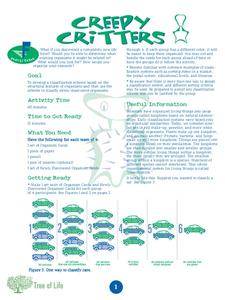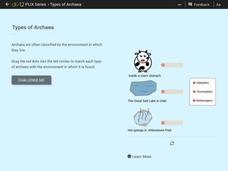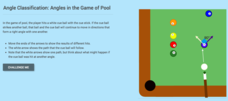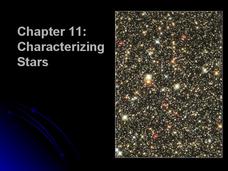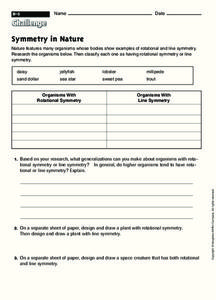Curated OER
Dichotomous Key
Students draw comparisons between organisms. They classify organisms. Students are introduced to dichotomous keys and how to create and use a dichotomous key to identify a variety of objects. They begin by defining classification, and...
Curated OER
Creating Groups and Sorting
Students practice classifying. In this classifying and oral language lesson, students listen to the story My Big Truck Book by Roger Priddy and identify similarities between the trucks described. Students sort the children in their class...
Curated OER
Creepy Critters
Learners classify imaginary newly discovered organisms. In this classification lesson, students are given cards showing imaginary organisms that have been recently discovered. They must classify the organisms based on their characteristics.
Curated OER
Jewel of the Earth
Pupils investigate several organisms, set sticky traps to collect them, and attempt to identify and classify them using a variety of sources. The origins of the organisms are traced and their adaptive features examined.
Curated OER
Creepy Critters
Pupils develop a classification scheme based on the structural features of organisms. In this organism instructional activity students divide into teams and complete a fun activity.
Cornell University
Classification
Explore the scientific method of classification. An interactive activity asks learners to create a classification system for a group of objects and develop a flow chart to communicate their systems. In addition, individuals use a...
Curated OER
Classifying Rocks
A well-designed lesson plan on rock classification awaits you. In it, fifth graders are divided into groups. Each group is given a box of rocks which they must sort into two categories. They use the "Rock 'n Roll Rule," in making their...
Curated OER
Earth Day Writing
Earth Day is a great topic to write about, and graphic organizers can really help learners classify their thoughts. Here is a fantastic set of themed worksheets that will allow your class to explore and write about conservation. Each...
CK-12 Foundation
Types of Archaea
One of the few organisms that are classified by the environment in which they live include archaea. The video describes the phylogeny of the group and their major characteristics. It details how they reproduce and discusses the diversity...
EngageNY
More Examples of Functions
Discrete or not discrete? Individuals learn about the difference between discrete and non-discrete functions in the fourth installment of a 12-part module. They classify some examples of functions as being either discrete or non-discrete.
CK-12 Foundation
Angle Classification: Angles in the Game of Pool
Make a game of angle classification. Using the direction of the pool ball, scholars determine the measure of the created angles. They work to create and classify different types of angles throughout an engaging interactive.
Glynn County School System
Other Galaxies
The Milky Way belongs to a cluster of galaxies called the local group and it could be considered our neighborhood! Use the PowerPoint to present information on the different galaxy types, both local and farther away. Scholars learn how...
Glynn County School System
Characterizing Stars
Are brighter stars actually brighter? Turns out they are probably just closer! A presentation compares features of stars to our favorite star, the sun. In addition, solar lovers learn to classify stars based on their masses,...
National Nanotechnology Infrastructure Network
Big vs. Little - Macro to Micro Lesson 5
It is a long way from nano to macro. Learners examined the scale of measurement from macro to nano in the first four lessons of the five-part series. With the final installment, they review what they learned by classifying objects in one...
Curated OER
Environmental Conditions: Friend or Foe
Students research and answer questions on how organisms are classified and how their needs are met through their environment. They work in small groups and create a poster, chart, rap, PowerPoint, or brochure demonstrating how organisms...
Curated OER
Classifying Critters
In this classifying critters worksheet, students read a 1 page article on classifying living organisms and then answer 10 true or false, short answer, multiple choice or fill in the blank questions.
Curated OER
Classifying Life
In this classifying life worksheet, students review the 5 kingdoms of organisms by completing 10 matching and 7 fill in the blank questions.
Curated OER
Symmetry in Nature
In this symmetry instructional activity, students put organisms into categories of having line symmetry or rotational symmetry and answer questions about them. Students put 8 organisms into the chart and answer 3 questions.
Curated OER
Classification And Identification
Pupils explore diagrammatic and taxonomic keys and their application in the marine sciences. They sort and classify objects and organisms based on visual attributes.
Curated OER
Critter Museum
Students act as directors of a new science museum where they have decided to set up a display of animals without backbones that are found in the area. To organize their display, they need to sort and classify a collection of animals and...
Curated OER
What are Mammals?
Pupils differentiate between wild and tame animals, explain how to classify mammals into groups based on common charactertistics and comprehend the values of zoos. They listen as the teacher reads Psalm 50:10 and explains that all of the...
Curated OER
The Void Filled by Nonprofits
High schoolers examine the significance of nonprofit organizations in a democratic society. They conduct research on a selected nonprofit organization, complete a questionnaire, and present their findings to the class.
Curated OER
Animals That Fly or Do Not Fly
Students classify animals according to if they can or cannot fly.
Curated OER
How Do Parts Help Classify Plants?
In this classifying plants worksheet, students will brainstorm different types of roots, stems, and leaves and determine how those differences help scientist classify plants into different categories.




